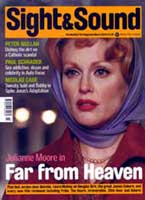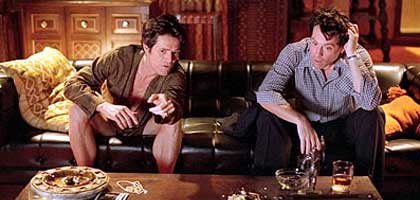
Swing high, swing low
Film of the Month: Auto Focus

Charting the double life of US sitcom star Bob Crane, Paul Schrader's Auto Focus is a darker antidote to Boogie Nights. By Linda Ruth Williams.
Paul Schrader does biopics like no other director, choosing the most lurid and disastrous subjects, from his co-written Raging Bull screenplay to Mishima to Patty Hearst. His latest film is a splendidly taut example of the genre: Auto Focus dissects the sordid notoriety of real-life TV celebrity Bob Crane (Greg Kinnear), whose rise and fall during the 1960s and 70s is one of the most sensational tales American showbiz has to tell. The star of Hogan's Heroes, Crane's fame shifted from the squeaky-clean kind that only family-friendly US network television can give you, to disgrace born of a life driven by epic, proliferating promiscuity and an obsession with filming his sexual adventures. Crane is now perhaps more famous for his death than the achievements of his life: he was murdered in a motel room in 1978.
Auto Focus centres on family man Crane's fateful meeting with video technician and arch sleazeball John Carpenter (Willem Dafoe, here out-sliming even his most slippery past performances). A veteran of The Donna Reed Show, Crane at the start is a banal, blank-eyed, church-going family man with compliant kids and a supportive wife, Anne (played by the spunky Rita Wilson). This bland vacancy remains somehow unchanged through Crane's journey; prolific sex and imprudent souvenir keeping make him no more interesting. Carpenter takes Crane to strip clubs, gets him hooked on the latest boy-toy hi-fi and video technology, and puts the two together. Soon Crane is doing the nasty accompanied by his nasty friend, and taping it all with his friend's newfangled equipment.
The film seems at first like a singular meditation on a very individual man's unique obsession with the recording of sex, but it is also an exemplary Schrader work, a painfully funny and misanthropic treatise on American masculinity and its sexualised image (a companion piece, perhaps, to Schrader's sleeker, cleaner American Gigolo). Corporate Hollywood is adept at capitalising on its televisual past (Mission Impossible, The Flintstones), though liberal film-makers have long been suspicious of it (Quiz Show, Pleasantville, The Truman Show). Schrader manages to defamiliarise Hogan's Heroes, so we see it not as the American institution it became but essentially as it was: a ludicrously bad-taste sitcom about clubbable POWs and jocular Nazis (Anne derides it as "a Holocaust comedy"). It might be hard for British viewers to understand both how successful the formula was, and how famous Bob Crane became on the back of it. But then again ours is the nation which has produced at least two World War II sitcoms, the esteemed Dad's Army and the crass 'Allo 'Allo. Imagine Arthur Lowe spiralling into scandalous obsession and ending up murdered in a motel room within a decade of Dad's Army's peak and you get close to the scale of Crane's fall.
Schrader presents Crane as someone who aspires to be Jack Lemmon, but settles for being a suburban Hugh Hefner, tit-obsessed and leisurewear-clad. ("Tits are great!" he exclaims with the flat enthusiasm of someone selling a car, over an amazing montage of dozens of them, spliced together and filling the screen.) Crane was something of an inbetweenie as far as cultural trends go, and Auto Focus pitches this dissonant lack of belonging perfectly. A swinger outside fully fledged sex culture, he is also too politically and unfashionably square to be a happy bedfellow to the free-love generation. At a hippie party Crane and Carpenter approve of the bare breasts, but baulk at the anti-war atmosphere. They welcome the advent of video timers because it means they can continue the sex without missing the Johnny Carson Show.
With his studied affability, Kinnear delivers a near-perfect performance as Crane. It's a huge achievement of mimicry, but at the same time so shiny and hard one could believe there is nothing behind Crane's commercial veneer. He is as much a creation of television celebrity as, say, Jim Carrey's Truman, seemingly incapable of private moments. Even sex is shared with a cameraman (Carpenter) and a future viewer (usually Crane and Carpenter together, casually masturbating as they watch and talk of inconsequential things). Smiling his cheesy grin to Carpenter's camera, Crane looks more like he's on a fairground ride than fucking a woman from behind while being filmed by another man: dead eyes, broad smile.
Crane's blithe lack of control over his sex life demands that Schrader take meticulous command - it's almost as if the careless subject must have his biographer be paranoid for him. In one surreal, psychotic moment, the craziness of Crane's desire simultaneously to be all-American hero and prize philandering pervert manifests itself in an on-set hallucination: his glamorous co-star appears in a basque and prepares to get it on with the mock Germans. Then Anne and the children appear and tell him to go fuck her. What's most disturbing about this bizarre moment of permissive permission-giving isn't that the anodyne Crane can have such elaborate fantasies, but that he might just be allowed to get away with doing whatever he wants. The varnish only begins to crack near the bottom of his downward spiral, in the jittery, bleached-out handheld camerawork which tracks his final weeks.
But perhaps Crane's most fatal lack of self-perspective comes in his assumption that heterosexuality, however rampant, constitutes normality. From the far reaches of scandal he still insists to his incredulous agent, "I'm the friendly guy!", and "Tell them sex is normal." How straight is a form of hetero-sex which only operates with another guy in tow, which features penis comparison and a fair bit of parallel masturbation, is one question the film asks. Carpenter's interest in Crane is pretty avowed by the end; Crane's in Carpenter remains more surreptitious. Death appears to come at the hands of a jealous, spurned lover: though there was not enough evidence to try Carpenter (who died in 1998) for Crane's murder, Schrader's film, via Crane's posthumous voiceover (a nod to Sunset Blvd), effectively indicts him again.
Schrader started his film life as a writer and critic, and fires critical concepts around as readily as his sometime collaborator Scorsese fires bullets, expecting us to catch them as they pass. Auto Focus could be an attempt to dispatch film theory's ongoing scopic obsession - the moral of Crane's saga seems to be that all this looking at looking in the end gets you nowhere, or nowhere very interesting. One telling two-shot features Crane next to his own image on a monitor, but the image and its double are the same - nothing changes in this recording and repeating of self. This grand-scale, exponential voyeurism only leads to ennui spiralling in downward circles - the circle described when you end up watching yourself watching. This is reflexivity with no reflective perspective, in which even death comes in the form of a scopophilic joke: as if in some morbid reworking of Peeping Tom, Crane is bludgeoned with his own tripod.
Schrader doesn't even give Crane the posthumous credit of being an inventive lover; the sex is simply a succession of the same few heterosexual acts, only varied by the change of partner. Yet for all this clever prurience, Auto Focus is not itself a sex film. There are no extended or explicit sex scenes, just handfuls of psychic corrosion. Auto Focus is the antidote to Boogie Nights - a feel-bad movie about visual sexual obsession which tracks its Don Juan all the way to TV hell and back again.
